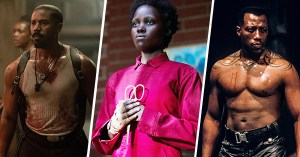Patrick Stewart and the Star Trek: Picard Crew on Why the World Needs Jean-Luc Now More Than Ever
After two decades away, Stewart returns to his iconic Star Trek role. Why now? The celebrated actor, his costars, and the series' creative team explain.
The news that Patrick Stewart had, after 19 years, agreed to return to the character of Jean-Luc Picard, the Star Trek role that made him a global celebrity, sparked loads of excitement among the fanbase. As the 79-year-old actor explained, the decision to head back into the universe that Gene Roddenberry created, relied on the caveat that Picard would boldly go where no Star Trek series has gone before.
“I don’t mean to give any offense to anyone, but I struggled a little bit with this issue,” Stewart told select members of the press at the official junket for Star Trek: Picard. “I was so obsessed with this idea that we must leave The Next Generation behind, that we must pull the curtain down on that and explore new things.”
In the latest Star Trek series on CBS All Access, a strong ensemble of Star Trek newcomers join Stewart; Isa Briones plays the mysterious Dahj, Michelle Hurd appears as former Starfleet Officer Raffi Musiker, Alison Pill plays Dr. Agnes Jurati, and Santiago Cabrera takes on the role of hot-headed pilot, Chris Rios.
“It is not the same world when we wrapped The Next Generation,” Stewart continued. “And I argued that I wanted that change and that world to be reflected insofar as it affected Jean-Luc and what had happened to him. The backstory of those 19 years is very, very important. But the great thing about it is — and I wasn’t prepared for this — I discovered I also lived through those 19 years; Patrick had lived through them. And I had changed. I’m different. I feel differently about the world that I’m living in, and in subtle ways.”

(Photo by Matt Kennedy/CBS)
As Star Trek fans know, there are multiple timelines that exist within this cinematic universe. That can add continuity confusion, depending on a viewer’s expectations with Star Trek: Picard. Showrunner Alex Kurtzman explained that the Romulan supernova that impacted the events of J.J. Abrams’ 2009 movie, which sparked a new timeline and universe separate from the original Star Trek series — this event is also referenced in Picard — is the catalyst for the vastly different timelines that exist across the Star Trek universe. That’s a lot to take in for new viewers, but the return of Stewart in his iconic role will most likely be a huge draw for people to tune in. Through all the strife Picard has been dealt since we last saw him, he’s still the highly-revered Starfleet admiral fans have grown to love and respect.
“We live in a continuity of a timeline,” Kurtzman said. “There’s emotional experiences that have certainly informed the show, but [Patrick Stewart] did not want to just play the part he had played in the same way. And I think you’ll find, as you go on that, fundamentally, Picard, as a character, has not changed. He’s not the dark angry version of Picard. He’s still very much the man you know from Next Generation. But the circumstances of his life have changed radically and threw him off course. And so he’s really wrestling with who he is now and what it means to be Picard in a world where not only does he not have an army, but things are very, very gray. How do you hold on to your clear moral compass in a world that’s very gray? There is no greater captain in my mind for that challenge than Picard.”

(Photo by James Dimmock/CBS)
According to series co-creator Michael Chabon, one of the themes Star Trek: Picard explores is the “it’s never too late” concept of age and retrospection. This, according to Chabon, is something mostly unseen in the Star Trek universe.
“What we haven’t ever had before, not just on Star Trek, but on almost any television show ever, and certainly any kind of serious dramatic television show is a central protagonist — a hero — who is effectively 80-years-old. Patrick was 78 when we started, he is 79 now. Jean-Luc Picard, in canon, is about 92. To have a person at that point in his life, reckoning with that question of: What does it mean to be a man, a human, a captain, a leader? And now he’s an old man and he’s still trying to answer that question, just like Star Trek is always trying to answer that question, but he’s answering it in a different way than he did before.”

(Photo by James Dimmock/CBS)
Discovery ended up being the first series in the Star Trek television universe that strayed from the narrative formula of exploring a different mission on-board a starship in every episode. Star Trek: Picard takes that storytelling baton and runs with it. Not only does much of the program take place on Earth, the series, which Kurtzman identifies as “the first true adult drama in the world of Star Trek,” hones its focus on the characters in the world and not just that of Jean-Luc Picard.
“Uniquely, that’s a kind of storytelling which I don’t think has been done much, period. Much less, in Star Trek,” executive producer Akiva Goldsman added. “So we’re super delighted by that prospect because, as storytellers, it gets us to do the narrative hours in a way that’s different and complicated. Relationships get to change and move, and you get to show one thing and then reverse it up.”

(Photo by James Dimmock/CBS)
As much as the team was able to switch things up and delve into a more character-driven storyline, essentially creating a 10-hour movie, in the process, Goldsman asserted that Star Trek: Picard was made for both the die-hard Trek fans and newbies alike.
“We’re trying to be able to deliver emotion and information and philosophy and character in a way that is engaging because you’re watching it,” Goldsman said. “And if you know everything about it, you’re like, ‘Well, that was cool.’ And if you know nothing about it, you’re like, ‘Well, that was cool.’ And it might be cool, differently. It may have more color, or more revelation, depending on where you live in that spectrum of audience. But we really, really wanted to be welcoming of a listener’s heart. Because that’s part of the story we’re trying to tell.”
Chabon agreed: “We were absolutely committed to the idea that we wanted to make a show that, if you’ve never seen Star Trek — if you’re not sure what Star Trek really is even all about and you think you don’t like Star Trek because what you’ve seen before hasn’t really grabbed you — or if you’re a total novice, you will be able to sit down and still watch the show and enjoy it.”

(Photo by James Dimmock/CBS)
Of course, having Patrick Stewart involved helps. The familiarity of fans to the actor, whose cinematic repertoire blossomed greatly after leaving the world of Star Trek behind, will surely help bring newbies into the fold. And, against his previous wishes, Stewart eventually warmed up to the notion of bringing some Next Generation characters and storylines back for another go in Picard.
“I was involved in meetings I’d never been involved in as an actor before,” Stewart, who had the added responsibility of co-executive producer on the series, explained. “I could contribute. And I began, increasingly, to feel my colleagues from Next Generation, we need to see them. They, too, can reflect how the times have changed. I think it was the right thing to do. And I hope, with time, we are able to see more.”
To keep track, four familiar faces will be joining Jean-Luc Picard on this new adventure. Brent Spiner is reprising his role as android Commander Data. Marina Sirtis is returning, alongside Jonathan Frakes — who, once again, steps behind the camera to direct — as Deanna Troi and William Riker, respectively. Star Trek: Voyager‘s Jeri Ryan and Star Trek: The Next Generation‘s Jonathan Del Arco will be bringing their beloved Borg characters, Seven of Nine and Hugh, to this new tale, as well.

(Photo by James Dimmock/CBS)
Thematically, Star Trek has always operated best when it’s held a mirror up to society to show us what works and what needs fixing. The first interracial kiss on television happened in the original series, between Captain James T. Kirk (William Shatner) and Uhura (Nichelle Nichols). Star Trek has always been a series based on the ideas of inclusion and exclusion while digging into the evolving question: what is humanity? These are some of the ways Roddenberry’s concept has thrived for over the past five decades. And that’s a trend that continues in Star Trek: Picard.
“This was one of the shows that our family, as a family, would happily sit down and watch,” Michelle Hurd explained. “When I got this job, that’s the first thing I remembered: sitting with my mom and dad and my two sisters and watching the show. Not only because of Uhur,a but the fact that it was telling the stories of people who were ‘other,’ the people who were pushed away. It just really brought me back to the understanding that Star Trek is more than just a show; it’s a place where we can all be seen and represented and it makes me so proud to be part of it.”
Every Star Trek has a bridge family, and, in Picard, a rag-tag crew eventually forms. But every unit needs a leader, and Stewart discovered stepping back into his most iconic role was quite easy.
“He’s never left me,” the actor admitted during the 2020 Television Critics Association winter press tour.

(Photo by James Dimmock/CBS)
Jean-Luc Picard may have been gone from our screens for nearly two decades, but his return is coming at just the right time, Kurtzman said.
“Right now more than ever, we need great leaders. We need great leaders like Jean-Luc Picard. And we don’t have them,” Kurtzman added. “My hope is that we will inspire people to remember that and think about that deeply. And the next generation that is now much more vocal about many of the problems they’ve been left with, because of previous generations, will look to something like Star Trek and say it’s possible. You know, maybe we won’t get there in our lifetime. But maybe we can lay brick for our children’s children to get there.”
Star Trek: Picard premieres on Thursday, January 22 on CBS All Access.







